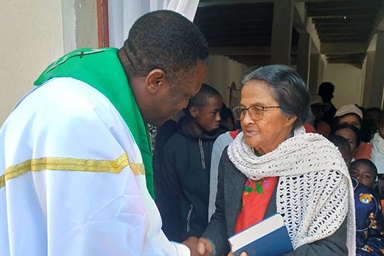The effects of the deadly Ebola outbreak in West Africa still linger at June Hartranft Memorial Primary School for Girls.
Several of the school’s boarding students face an uncertain future as authorities struggle to locate their parents nine months after Ebola ended in the country.
Just this week, the school learned that the parents of two sisters had died of Ebola.
The girls were among nine students, ranging in age from 10 to 15, who initially lost contact with their parents at the peak of the outbreak in their hometown of Kailahun, the first district affected by Ebola in May 2014. More than 11,000 people died in the Ebola outbreak, the majority of them in Sierra Leone, Liberia and Guinea, according to the World Health Organization.
At the end of that school year, Kailahun was recording the highest number of Ebola cases and deaths, according to the Rev. Jane Lahai, head teacher at June Hartranft, a United Methodist primary school for girls ages 6-12.
How you can help
Donate to the June Hartranft Memorial Primary School for Girls through Advance #3021929.
You can donate to help United Methodist health systems in Ebola-ravaged areas through Global Health Advance, #3021770.
Learn more about those efforts by United Methodist Global Ministries.
Read more about how the church responds to Ebola.
“Parents normally give us their cell phone numbers so that we call them at the end of term to collect their children at the farthest point the school bus can take them to …. When I called the Kailahun parents (in 2014), none could pick up the call,” Lahai said.
She immediately informed the Social Welfare ministry and the Family Support Unit of the Sierra Leone police.
By the end of the Ebola crisis, school authorities could only establish contact with the parents of four of the children.
“But there are still (girls) with us. Those ones we don’t know if their parents are alive or dead. The school is doing all we can to support them,” Lahai said.
No word from families
Esther Cooper, 15, from Buedu in the Kailahun District, was admitted to the school in 2012. “We wanted to go on holiday in 2014, but we were stopped and told our parents had passed away,” Cooper said.
She said she has not heard from her family since then. Despite her circumstances, she said she loves the school and is well taken care of.
“I love mathematics and would want to be a banker when I grow up,” she said.
Sisters Aminata, 11, and Hawa Bayoh, 10, also from Buedu, do not remember when they last spoke with their parents. Like Cooper, they came to the school in 2012.
“We are taught well. We are supplied learning materials and they clothe us. We are fed well,” said Hawa Bayoh, who wants to be a pastor when she grows up so that she can “preach God's message to people.”
Lahai said the school provided a home for the girls.
“We housed the girls in the boarding home throughout the Ebola period, even when schools throughout the country were closed, until we ran out of food,” Lahai said. “But we received a lot of support from the Moyamba community, Social Welfare ministry and non-governmental organizations like PLAN International.” Plan is a global nonprofit that works in partnership with communities to end poverty among children.
Adding to the problem, she said, are families who abandon their children at the boarding home. They don’t visit or take calls from school administration.
“I have two children right now in that category,” she said. “When we call their parents, they reject our calls,” she said.
An uncertain future
The school, which has an enrollment of 466 with 65 who board, has been providing welfare and learning materials for all seven girls since the Ebola outbreak.
“Since we closed school for the last academic year, we have not got help yet. We are feeding and taking care of them with funds from the boarding home.”
Coping with the situation is becoming dire especially as some of the children are now graduating from the primary school for secondary education.
With no solution in sight, Lahai has begun making arrangements for some of the girls to stay in her home.
"They might end up living with me at home because I retire next academic year and would not want to transfer their burden onto the head teacher taking over from me. I have already introduced them to my home and started teaching them a few home chores," Lahai said, adding that she would need support to take care of them.
While the future of the girls remains uncertain, Lahai said she has been coping “through the grace of God.”
“When I’m really pushed to the wall, I look up to First United Methodist Church in Pennsylvania who have been of tremendous support to the school over the years,” Lahai said.
The church in Ephrata, Pennsylvania, supplements boarding costs and supports the school’s feeding program, which provides lunch for all students and staff.
“In a community where poverty is rife and not many families can afford food for their families, the assurance of at least a meal a day can put the minds of the children focused in class,” Lahai said. "Some children come to school hungry. At lunch time, they are happy because they are sure of a good meal.”
Jusu is director of communications for The United Methodist Church in Sierra Leone. News media contact: Vicki Brown at (615) 742-5470 or [email protected].
Like what you're reading? Support the ministry of UM News! Your support ensures the latest denominational news, dynamic stories and informative articles will continue to connect our global community. Make a tax-deductible donation at ResourceUMC.org/GiveUMCom.




